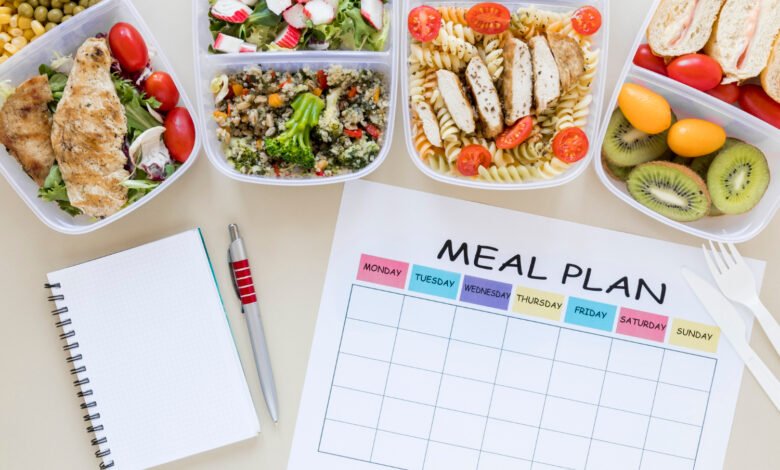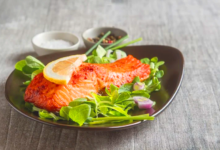Lose Weight Fast with a 7-Day Meal Plan

Losing weight is a common goal for many individuals seeking a healthier lifestyle. While there is no magic pill or secret formula, combining a well-structured meal plan with exercise can help you achieve your weight loss goals efficiently. In this article, we will explore the concept of losing weight fast with a 7-day meal plan to kickstart your journey.
Welcome to the world of weight loss! Whether you’re aiming to shed a few pounds or embark on a significant transformation, a strategic approach is key. This article will guide you through the process of losing weight quickly while ensuring proper nutrition and healthy habits.
Read More: How To Naturally Lose Weight With Balanced Nutrition
Understanding Weight Loss

The Science Behind Weight Loss
Before diving into meal planning, it’s crucial to understand the science behind weight loss. Simply put, losing weight requires creating a calorie deficit. This means consuming fewer calories than your body needs, forcing it to tap into stored fat for energy. It’s important to note that weight loss should be gradual and sustainable to maintain a healthy balance.
Setting Realistic Goals
Setting realistic goals is vital to stay motivated throughout your weight loss journey. Remember that healthy weight loss ranges from 1-2 pounds per week. Aim for long-term success rather than immediate results, as crash diets and extreme approaches often lead to disappointment and rebound weight gain.
The Importance of Meal Planning
Meal planning plays a significant role in achieving your weight loss goals. It helps you stay organized, makes healthier choices more accessible, and prevents impulsive eating. By preparing your meals in advance, you can control portion sizes, select nutritious ingredients, and avoid the temptation of unhealthy options.
Creating a 7-Day Meal Plan
Now, let’s delve into the process of creating a 7-day meal plan that promotes weight loss while keeping your taste buds satisfied.
Calorie Calculation
To create an effective meal plan, you need to determine your daily calorie needs. Use online calculators or consult a nutritionist to estimate your Basal Metabolic Rate (BMR) and factor in your activity level. This will provide a baseline for calorie consumption, allowing you to structure your meals accordingly.
Choosing Nutrient-Dense Foods
Focus on incorporating nutrient-dense foods into your meal plan. Opt for lean proteins, whole grains, fruits, vegetables, and healthy fats. These foods provide essential vitamins, minerals, and fiber while keeping you satiated and energized throughout the day.
Balancing Macronutrients

A well-balanced meal plan includes a mix of macronutrients: carbohydrates, proteins, and fats. Carbohydrates provide energy, proteins support muscle growth and repair, and healthy fats aid in nutrient absorption. Distribute these macronutrients across your meals to ensure a balanced diet. Aim for a moderate intake of carbohydrates, focusing on complex carbs like whole grains and legumes. Incorporate lean sources of protein such as chicken, fish, tofu, or beans, and include healthy fats from sources like avocado, nuts, and olive oil. This combination will keep you feeling satisfied while supporting your weight loss efforts.
Meal Preparation Tips
Effective meal planning requires proper meal preparation. Here are some tips to make the process easier:
- Plan your meals for the week: Set aside dedicated time each week to plan your meals and create a grocery list.
- Batch cook: Prepare large quantities of staple foods like grilled chicken breast, roasted vegetables, or quinoa that can be used in multiple meals throughout the week.
- Portion control: Use food containers or meal prep containers to divide your meals into appropriate portions. This will help you avoid overeating and stay on track with your calorie goals.
- Schedule your meals: Create a schedule that works for you, incorporating regular meal times and healthy snacks to maintain energy levels and prevent hunger.
Sample 7-Day Meal Plan
Here’s a sample 7-day meal plan to jumpstart your weight loss journey:
Day 1:
- Breakfast: Spinach and mushroom omelet with whole-grain toast.
- Snack: Greek yogurt with berries.
- Lunch: Grilled chicken breast salad with mixed greens, cucumbers, and balsamic vinaigrette.
- Snack: Carrot sticks with hummus.
- Dinner: Baked salmon with roasted asparagus and quinoa.
- Dessert: Mixed fruit salad.
Day 2:
- Breakfast: Overnight oats with almond milk, chia seeds, and sliced bananas.
- Snack: Apple slices with peanut butter.
- Lunch: Turkey and avocado wrap with whole grain tortilla.
- Snack: Almonds.
- Dinner: Grilled shrimp with zucchini noodles and marinara sauce.
- Dessert: Dark chocolate square.
Continue the sample meal plan for the remaining days, ensuring a balance of nutrients and portion control.
Incorporating Exercise
While meal planning plays a crucial role in weight loss, incorporating exercise can accelerate your progress. Aim for at least 150 minutes of moderate-intensity aerobic activity or 75 minutes of vigorous-intensity activity per week. Combine cardio exercises like jogging or cycling with strength training to build lean muscle and boost your metabolism.
Staying Motivated
Staying motivated throughout your weight loss journey is essential for long-term success. Here are some strategies to keep you inspired:
- Set small milestones: Break your overall goal into smaller, achievable targets. Celebrate each milestone to stay motivated.
- Find a workout buddy: Exercising with a friend or joining a fitness class can make workouts more enjoyable and provide accountability.
- Track your progress: Keep a journal or use a fitness app to track your meals, exercise, and progress. Seeing your achievements can motivate you to continue.
- Reward yourself: Treat yourself to non-food rewards for reaching your goals. This can be a massage, a new workout outfit, or a day of relaxation.
Tracking Progress
Regularly monitor your progress to stay on track and make necessary adjustments. Track your weight, measurements, and body composition changes. Remember that weight loss is not solely about the number on the scale. Focus on how you feel, your energy levels, and the positive changes in your overall well-being.
Conclusion
Embarking on a weight loss journey requires commitment, dedication, and a well-structured plan. By creating a 7-day meal plan that focuses on nutrient-dense foods, balanced macronutrients, and portion control, you can kickstart your weight loss goals in a healthy and sustainable way.
With this comprehensive 7-day meal plan and the incorporation of exercise, you’re well on your way to achieving your weight loss goals. Stay consistent, listen to your body, and make adjustments as needed. Remember, the journey is as important as the destination.
Read More: Scientists Find the Necessary Weight Loss Genes in Worms
FAQs
Can I modify the sample meal plan to suit my dietary preferences?
Absolutely! The sample meal plan is a guide to help you get started. Feel free to make substitutions based on your dietary preferences, allergies, or restrictions. Consult a nutritionist for personalized guidance if needed.
Should I consult a healthcare professional before starting this meal plan?
If you have any underlying health conditions, it’s always a good idea to consult with a healthcare professional or a registered dietitian before making significant changes to your diet or exercise routine.
Can I snack while following this meal plan?
Yes, snacking is allowed. However, make sure to choose healthy, nutrient-dense options like fruits, vegetables, or nuts. Be mindful of portion sizes to stay within your calorie goals.
Is it necessary to count calories while following this meal plan?
While calorie counting is not essential, it can be helpful to ensure you’re in a calorie deficit for weight loss. However, focus on overall healthy eating, balanced meals, and portion control rather than becoming overly fixated on exact calorie counts.
Can I continue this meal plan beyond 7 days?
Yes, you can continue this meal plan beyond 7 days if it works well for you. However, consider introducing variety to prevent boredom and ensure you’re getting a wide range of nutrients from different food sources.







